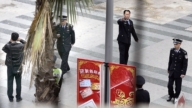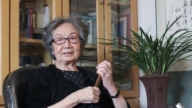【新唐人2013年08月09日訊】近年來,中國大陸很多貪官和商人紛紛想盡辦法將錢財轉移國外,掀起一股投資與收購境外資產的熱潮。最近法國反洗錢部門指出,中國人收購了法國越來越多的葡萄園,但許多跡象顯示:這些買主可能是在利用收購葡萄園來洗錢和掩蓋罪行。下面請看報導。
法國「經濟財政部」下屬的反洗錢機構Tracfin(Traitement du Renseignement et Action contre les Circuits FINanciers clandestins,非法金融資本流動信息收集和處理,下稱Tracfin)近期公布的2012年調查報告顯示,法國葡萄園的買主中與中國有關聯的人越來越多。有些買主作了複雜的交易安排,通過一系列投資公司來購買葡萄園,使得法國政府難以確認資金的來源及合法性。因此,反洗錢機構敦促法國當局對購買葡萄園的中國買主提高警惕。
美國南卡羅萊納大學「艾肯商學院」教授謝田:「法國政府的這個調查揭開了一個很好的迷,就是說,我們可能不能排除這些所謂的收購,實質上是一種洗錢,實質上是中共的貪官把貪污腐敗得來的錢合法化的一個過程。」
在大陸,多年前出現了一個新的行業,那就是為貪官轉移不法收入,從中賺取高額服務費。有大陸民間投資顧問對《新唐人》表示,自己接觸的人中,就有人在幫助一些財團和所謂的「達官貴人」洗錢。
大陸民間經濟學家鄭先生:「不管是買葡萄園也好,在海外採購、進行甚麼(商業活動)也好,這些事情不是今天才有。而是他們一直悄悄進行好多年了。」
致力於減少發展中國家不法來源收入的華盛頓研究機構「全球金融誠信」(Global Financial Integrity,簡稱GFI)經調查發現,2000 年到2011年間,中國非法外流的資金高達3.79萬億美元。
近年來,中國人在海外多地掀起收購酒莊的狂潮,僅在法國葡萄酒之都波爾多一地,中國人目前就擁有約數十個葡萄園。外界預計,中國人將在不久之後,成為在當地擁有葡萄園數量最多的外國人。
對此,台灣國立政治大學「美國與歐洲研究所」所長湯紹成表示,中國人在海外收購酒莊有多種原因,比如:有人可能看中了這些酒莊的產品品質、有的則想通過投資進行移民。
台灣國立政治大學「國際關係研究中心」「美國與歐洲研究所」所長湯紹成:「有很多大陸的不法人士,包括貪官等。這些人他們可能會把他們用不法手段所得來的資金拿到國外去。」
調查還發現了另一個明顯的發展趨勢,很多購入葡萄園的中國人會很快將葡萄園轉讓給其他中國人,而且轉讓週期越來越短。
大陸《財新網》報導,2012年Tracfin共收到2.7萬份信息通報,做過近3.5萬份調查,並將522份文件交給司法部門。Tracfin在接受波爾多當地報紙《西南報》(Sud Ouest)採訪時說,中國在法國的資金流動頗為複雜,法國很多政府部門正在對此進行調查。但Tracfin沒有明確回答是否已將一些具體卷宗移交司法部門。
美國南卡羅萊納大學「艾肯商學院」教授謝田:「洗錢本身是對國際金融秩序的擾亂,是一種非法行為。所以法國警方必須對此進行調查。」
美國南卡羅萊納大學「艾肯商學院」教授謝田談到,如果洗錢屬實,酒莊的前主人、相關的會計和律師事務所等很多人都會被捲入案件。如果案件涉及到中共的官員,那麼又將遇到一個經典性的讓中共尷尬的問題:中共到底是真反腐還是假反腐?反腐是不是可以反到政治局委員一級或者政治局常委一級?
採訪/易如 編輯/李謙 後製/葛雷
Buying French Vineyards: an Investment or Money Laundering?
In recent years, many corrupt officials and businessmen in
Mainland China searched for ways to transfer money abroad,
which set off a wave of foreign assets acquisition
and investment.
Recently, French authorities at Treatment of Information
and Action Against Illicit Financial Circuits (TRACFIN),
an anti-money laundering agency, pointed out that Chinese
people have acquired increasingly more vineyards in France.
However, many indications show that these buyers may be
doing so to launder money and cover up their crimes.
A recent 2012 report by TRACFIN indicated that more
buyers of French vineyards were associated with China.
Some buyers used sophisticated trading arrangements,
through a series of investment companies, to buy vineyards.
This made it difficult for the French government to confirm
the source and legitimacy of funds.
Therefore, TRACFIN urged the French authorities to be on
high alert regarding Chinese vineyard-buyers.
Professor Xie Tian, at Aiken Business School, University
of South Carolina: “The French government’s investigation
uncovered quite a mystery, and we may have to include
these acquisitions as a form of money-laundering.
Actually, it is a process for officials to legitimize
their money through corruption."
In Mainland China, many years ago there was a new industry
which provided services and earned high fees in transferring illicit income.
Some Mainland investment advisers told NTDTV that a few
of their contacts were helping VIP’s launder money.
Mainland economists Mr. Cheng: “Whether buying
a vineyard or engaging in other business activities abroad,
this has been quietly taking place for quite a few years."
A survey from Global Financial Integrity (GFI),
a Washington-based research organization committed
to reducing illicit income, found Chinese illegal outflow
of funds was up to $3.79 trillion from 2000 to 2011.
In recent years, the Chinese set off a winery acquisition
frenzy in other countries.
Dozens of wineries in Bordeaux, France alone
are Chinese owned.
Observers expect that the Chinese will become the largest
group of foreign owners of local vineyards in the near future.
Tang Shao-cheng, director of American and European
Studies at Taiwan National Political University, said,
“Many people like to buy vineyards overseas for a variety
of reasons.
Some like the quality of the wine, and others
like to immigrate through investment.
Many unscrupulous people from Mainland, including corrupt
officials, may take their illicit money overseas."
The GFI survey also found another trend.
Chinese owners of foreign vineyards quickly sell
their vineyards to other Chinese, and the transferring cycles
are becoming shorter.
Mainland news media, Caixin, reported that in 2012,
TRACFIN received a total of 27,000 communications
and has completed nearly 35,000 inquires.
Among these documents, 522 were sent to the judiciary.
TRACFIN explained during an interview with Sud Ouest
at Bordeaux that China’s financial liquidity in France
is quite complicated and many French government
departments are beginning to look into it.
But, TRACFIN did not confirm the specific dossiers
being handed over to the judiciary.
Professor Xie Tian at University of South Carolina:
“Money laundering itself is disrupting the international
financial order and is an illegal act,
so the French police must investigate it."
Professor Xie Tian mentioned that if money
laundering is true, the former winery owners,
the relevant accounting and law firms
as well as others may all be implicated.
If a case involves the Chinese Communist Party (CCP)
officials, it will run into an embarrassing question.
Is the CCP anti-corruption real and does it include
the Politburo Standing Committee members?




























